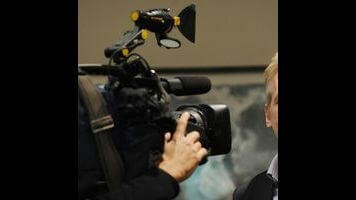Leave it to those wet blankets at PBS to ruin your March Madness fun by running a Frontline report on the fraudulence of college athletics right before Final Four weekend. “Money and March Madness,” the lead story on tonight’s magazine-format episode, may not convince you to tear up your bracket and skip the last few games of the tournament, but it’s a refreshing blast of outrage amidst all the myth-making and ego-stroking found on your major sports networks this time of year.
Given only 25 minutes to tell this story, reporter Lowell Bergman goes for the bold strokes. The NCAA, an allegedly non-profit organization, makes all the rules governing student athletics at 1100 colleges and universities. It also rakes in millions of dollars in corporate sponsorship deals, not to mention $10.8 billion for its current TV contracts related to coverage of the NCAA basketball tournament. Much of this money rolls back to the colleges and the high-dollar coaches they hire, but none of it goes to the actual players who make the tournament worth watching. According to Michael Lewis, author of Moneyball and The Blind Side, college athletics is “a purely commercial enterprise” that doesn’t pay its labor force.
The NCAA president, a beady-eyed ventriloquist’s dummy named Mark Emmert, counters that the student athletes are “pre-professional,” that they are compensated in the form of educational opportunities at the greatest universities in the country, and that they can’t be paid because they’re not employees. He says these things so often and in such a rote manner, I began to suspect he has a string coming out of his back and a speaker in his ass. He has nothing to say about the fact that only 1 percent of college basketball players go on to professional NBA careers, or that the student-athlete’s likenesses are used in videogames without their permission or compensation, or that athletic scholarships now cover only one year of college, after which they can be terminated if the coach decides he has no use for the player. Bergman doesn’t need to do much to help Emmert hang himself, but this "non-profit" president’s refusal to disclose his own salary is the icing on the gravy.
The problem with “Money and March Madness” is that it only skims the surface of this issue, which could have easily taken up a full hour of Frontline. There’s really no nuts-and-bolts discussion of the practicality of compensating student-athletes, or how such a system could be implemented. Instead, the piece touches on a lawsuit against the NCAA filed by former student-athletes trying to get a share of the proceeds from videogames as well as re-broadcasts of their classic tournament appearances. There’s also not much talk about the shady ways in which some student-athletes are compensated; John Calipari’s $4 million salary is mentioned, but there’s not a word about his two Final Four appearances with two different colleges, both of which have been vacated due to recruiting violations. (Calipari is back in the Final Four with his third institution, the University of Kentucky, so place your bets now on whether this appearance will stick.) If you have even a passing familiarity with this topic, you probably didn’t learn anything new from Bergman’s piece. Still, it’s always fun to watch a weasel like Emmert squirm.
The other two segments of tonight’s Frontline are sketches of two very different political activists. The first is artist Ai Weiwei, known to some as “the Beijing Andy Warhol.” Perhaps the best-known figure in contemporary China (although I’ll confess I’d never heard of him until tonight), Weiwei stages large-scale installations, such as covering the floor of the Tate Modern with 100 million hand-painted, porcelain sunflower seeds. More importantly, perhaps, he protests government corruption and the repressive Communist regime in China in a more open, outward way than is usually seen in that country. Using all the latest social media, Weiwei documents his own harassment at the hands of the police and leads a group project to uncover the names of thousands of students killed in a 2008 earthquake.
Weiwei seems like an interesting guy, which is more than I can say for Bradley Manning—at least from the brief glimpse Frontline has to offer tonight. The final segment is basically an interview with Manning’s father, along with a few quotes from his childhood friend, none of which gives us any particular insight into the Army soldier accused of leaking half a million classified government documents. Would you believe that Manning was a quiet boy who kept to himself? That he had very few friends? That he was really into computers? The big question I had about Manning—that is, how a guy like that ever got access to half a million classified government documents in the first place—goes unanswered, because it turns out this is only the first part of an ongoing story about Manning and Wikileaks. The full, hour-long version will air in May, and I’ll look forward to that, but I could have done without this teaser segment altogether.
Stray observations:
- I have to say, I prefer Frontline when it devotes the full hour to a single topic, in the same way I prefer a feature-length documentary to an episode of 60 Minutes. The magazine format seems ill-suited to PBS, as it seems to render everything just a little more sensationalized and superficial.
- Sonny Vaccaro is a pretty fascinating dude whose story probably could have filled the entire hour. He’s the guy who first paid coaches to get their students to wear Nike sneakers, thus kicking off the corporatization of college sports. But he’s also the guy spearheading the lawsuit to get former student athletes compensation for their appearances in videogames and televised reruns.
- I don’t follow college hoops closely myself, but feel free to make your Final Four predictions in the comments. But please, no wagering.


 Keep scrolling for more great stories from A.V. Club.
Keep scrolling for more great stories from A.V. Club.